
Leo Rasche, MD, discusses BCMA and GPRC5D loss after bispecific antibody therapy in multiple myeloma.

Your AI-Trained Oncology Knowledge Connection!


Leo Rasche, MD, discusses BCMA and GPRC5D loss after bispecific antibody therapy in multiple myeloma.

The addition of venetoclax to carfilzomib and dexamethasone increased response rates compared with carfilzomib plus dexamethasone alone in patients with t(11:14)-positive relapsed/refractory multiple myeloma.
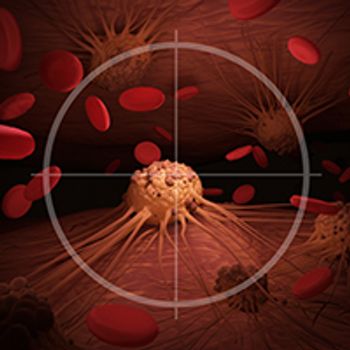
The novel anti-BCMA CAR T-cell therapy NXC-201 displayed safety and elicited hematologic and organ responses in patients with relapsed/refractory amyloid light chain amyloidosis, including frail patients.
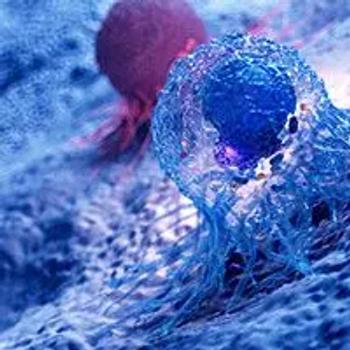
Patients with multiple myeloma exhibiting poor prognostic features, such as high-risk cytogenetics, soft-tissue plasmacytoma, ISS stage III disease, and triple-class exposure, experienced significant progression-free survival benefit with ciltacabtagene autoleucel.

The EZH2 inhibitor tazemetostat may mimic the role of the KDM6A gene in upregulating CD38 and CD48 expression, suggesting that this agent could restore responses to daratumamab in patients with multiple myeloma, according to a presentation at the 20th International Myeloma Society Annual Meeting.

The combination of iberdomide plus bortezomib and dexamethasone produced deep responses with a manageable toxicity profile in patients with transplant-ineligible, newly diagnosed multiple myeloma, according to data from the phase 1/2 CC-220-MM-001 trial presented at the 2023 International Myeloma Society Annual Meeting.
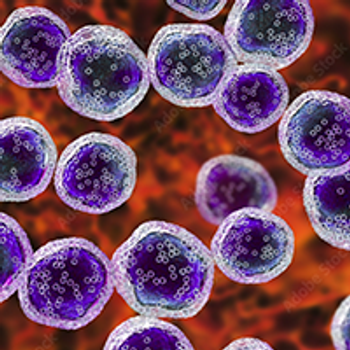
Treatment with teclistamab led to responses in patients with relapsed/refractory multiple myeloma, including those previously exposed to anti-BCMA therapies.

Forimtamig monotherapy generated high overall response rates and durable responses in all subgroups of patients with relapsed/refractory multiple myeloma enrolled in a phase 1a dose-escalation trial.

Although quadruplet combination regimens featuring daratumumab demonstrated consistent efficacy in the treatment of patients with newly diagnosed multiple myeloma, certain prognostic factors were associated with early relapse, according to data from a retrospective analysis presented at the 2023 International Myeloma Society Annual Meeting.

Treatment with teclistamab-cqyv in real-world patients with relapsed/refractory multiple myeloma elicited similar efficacy results and a comparable safety profile to findings from the phase 1/2 Majes-TEC-1 trial.

Induction daratumumab, carfilzomib, lenalidomide, and dexamethasone followed by consolidation double transplant sustained efficacy and safety in patients with high-risk, newly diagnosed multiple myeloma.
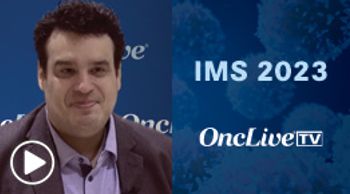
Joshua Richter, MD, discusses findings from the phase 1/2 LINKER-MM1 trial (NCT03761108) in multiple myeloma.
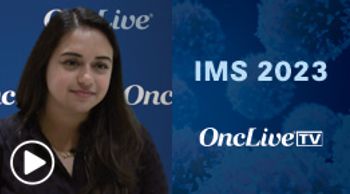
Shonali Midha, MD, discusses real-world data with teclistamab in patients with relapsed/refractory multiple myeloma.

Whole-genome sequencing of patients with multiple myeloma revealed that sequential immunotherapy was linked with antigen loss associated with treatment resistance and disease relapse.

Treatment with the combination of pomalidomide, bortezomib, and dexamethasone conferred a small, statistically nonsignificant overall survival benefit compared with bortezomib plus dexamethasone in patients with relapsed/refractory multiple myeloma.

Mezigdomide in combination with either bortezomib and dexamethasone or carfilzomib and dexamethasone showed encouraging responses across multiple dose levels in patients with relapsed/refractory multiple myeloma.

Use of the novel T-charge rapid manufacturing platform for the production of durcabtagene autoleucel CAR T cells within 2 days was successful in producing rapid and robust in vivo expansion, as well as long-term T-cell persistence in patients with relapsed/refractory multiple myeloma, according to a correlative analysis of data from an ongoing phase 1 trial presented at the 2023 IMS Annual Meeting.

Overall response rates with bispecific antibody monotherapy in patients with extramedullary relapsed/refractory multiple myeloma were lower than ORRs observed across all patients with relapsed/refractory multiple myeloma included in a systematic review evaluating the efficacy of this class of agents in this difficult-to-treat population.

Exercises such as resistance training and walking were safe and effective interventions that were associated with improved frailty scores in patients with multiple myeloma receiving systemic treatment.

Meral Beksac, MD, discusses overall survival data from the phase 3 OPTIMISMM trial in relapsed/refractory multiple myeloma.

Lisa Leypoldt, MD, discusses findings from the phase 2 GMMG-CONCEPT trial in patients with multiple myeloma.

Treatment with the combination of isatuximab, carfilzomib, lenalidomide, and dexamethasone generated high rates of minimal residual disease negativity in patients with newly diagnosed, high-risk multiple myeloma, irrespective of transplant status.

Ciltacabtagene autoleucel elicited high rates of minimal residual disease negativity in patients with heavily pretreated multiple myeloma who received prior treatment with a BCMA-targeted therapy.

Ciltacabtagene autoleucel elicited encouraging responses in patients with multiple myeloma who had received 1 to 3 prior lines of therapy and were refractory to lenalidomide.
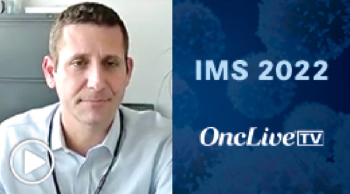
Adam D. Cohen, MD, discusses the efficacy of ciltacabtagene autoleucel in patients with lenalidomide-refractory multiple myeloma.
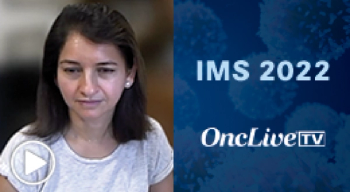
Noopur Raje, MD, discusses the utilization of bb21217 in patients with relapsed/refractory in multiple myeloma.
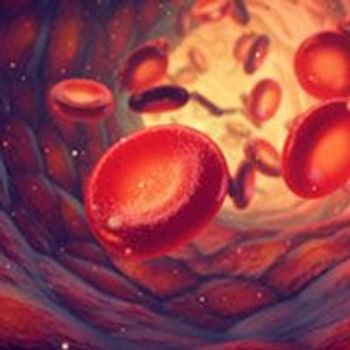
Identifying BCMA expression, copy number variation, and point mutations can have important therapeutic implications for patients receiving BCMA-targeting CAR T-cell therapy or T-cell engagers for multiple myeloma.

The addition of daratumumab to lenalidomide, bortezomib, and dexamethasone (RVd) induction and consolidation treatment and lenalidomide maintenance therapy (D-RVd/D-R) resulted in high minimal residual disease rates and prolonged progression-free survival in patients with transplant-eligible, newly diagnosed multiple myeloma.
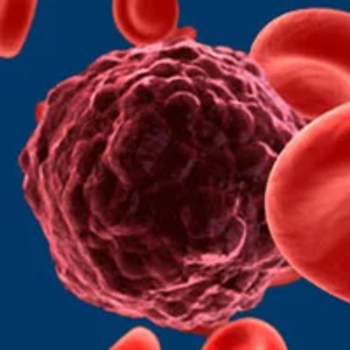
High-dose busulfan plus melphalan failed to generate a progression-free survival benefit vs melphalan for autologous stem cell transplant conditioning in patients with newly diagnosed multiple myeloma after induction therapy.

Promising safety and efficacy results were observed with the novel bispecific antibody ABBV-383 in patients with heavily pretreated relapsed or refractory multiple myeloma.